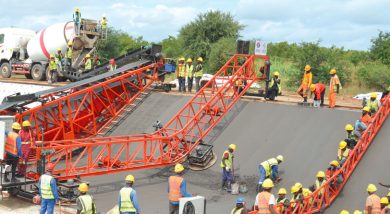Youths give back to the community
Frank Phiri, 20, from Traditional Authority Masula in Lilongwe dropped out of school while in Form Three because his parents could not afford school fees.
“My parents are extremely poor that we hardly afford a meal a day. After my father lost his job as a guard, there was no other source of income to enable him pay my school fees so I dropped out,” explains the third born in a family of seven.
Luckily, Frank’s parents qualified for the social cash transfer programme (SCTP), the sub-component of the livelihoods support programme of the Social Support for Resilient Livelihoods Project (SSRLP) implemented by Comsip Cooperative Union Limited.
Known as Mtukula Pakhomo, SCTP is a non-conditional critical safety net for the most vulnerable, ultra-poor Malawians.

The programme helps ultra-poor families to meet their basic needs and build resilience, with the ultimate goal of building human capital and moving them out of poverty.
To cushion the youth, Comsip has come up with the Youth Skills Challenge Support Programme to take them through vocational training and afterwards give them tools to start up businesses or get employment.
Under the Technical Education, Vocational and Entrepreneurship Training Authority (Teveta) in collaboration with the Ministry of Youth and Sports, the youth are being trained in cosmetology, tailoring, building, plumbing, carpentry and welding, among others.
Phiri trained as a carpenter from March to July 2023.
‘I had nothing to do, I used to wake up every morning just to hang around with friends on the streets. On a lucky day we could get some piece work,” he explains.
Now, Phiri and fellow youths who benefited from the initiative organised themselves to give back to their community. They are fixing broken furniture and mending curtains in public facilities for free.
“We believe the youth have a responsibility to develop their areas just like anybody else. Much as we are told we are future leaders, I believe we are leaders even today. As long as we are united, we can do something significant to contribute to our community,” he says.
Luso Langa Comsip Youth Cooperative chairperson Violet Finiasi echoes Phiri’s sentiments, adding that they parted ways with K60 000 from their savings to buy materials to fix the broken furniture and curtains at Dickson Health Centre.
The facility’s medical assistant Lameck Simkoko hails the youth saying the money meant for fixing the items would be channelled towards equally important needs.
Comsip case worker for the area Esther Mlima says the youth are also cleaning public facilities, apart from fixing the furniture and mending torn curtains.
Comsip Cooperative Union Limited development communication officer Mercy Kayuni expresses delight saying the youth are following one of the cornerstones of Comsip, which is to contribute significantly to the development of their community.
By the end of the SSRLP in 2027, Comsip will have trained 4300 youths under this initiative.
Those who are getting start-up tools are getting loans averaging K300 000 from COMSIV Limited, a finance subsidiary of Comsip Cooperative Union Limited, to establish them in business and they are signing community bonds to operate their businesses within their communities.
The first trained cohort has 721 youths from Chiradzulu, Blantyre, Phalombe, Balaka, Dedza, Lilongwe, Dowa, Ntchisi, Kasungu, Nkhotakota, Nkhata Bay, Karonga, Rumphi and Chitipa and the second cohort whose training begins in February 2024, targets 1789.
The start-up tools procurement for the first phase cost Comsip K192 million.
With a population of 19.8 million, Malawi remains one of the poorest countries in the world and has the second highest proportion of people living in extreme poverty in sub-Saharan Africa, according to the 2020 National Statistical Office and Unicef report.
It indicates that 61.7 per cent of the people are multidimensionally poor and poverty is higher in rural areas (70 per cent) than in urban areas (25.7 per cent).
The incidence of multidimensional poverty among children is 60.5 per cent.
Social services and social protection coverage remain largely inadequate to alleviate the vulnerabilities of children steeped in poverty.
The report found that Malawi children, adolescents and women experience multiple deprivations in terms of survival.





